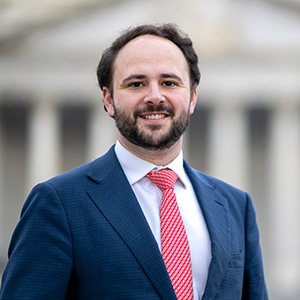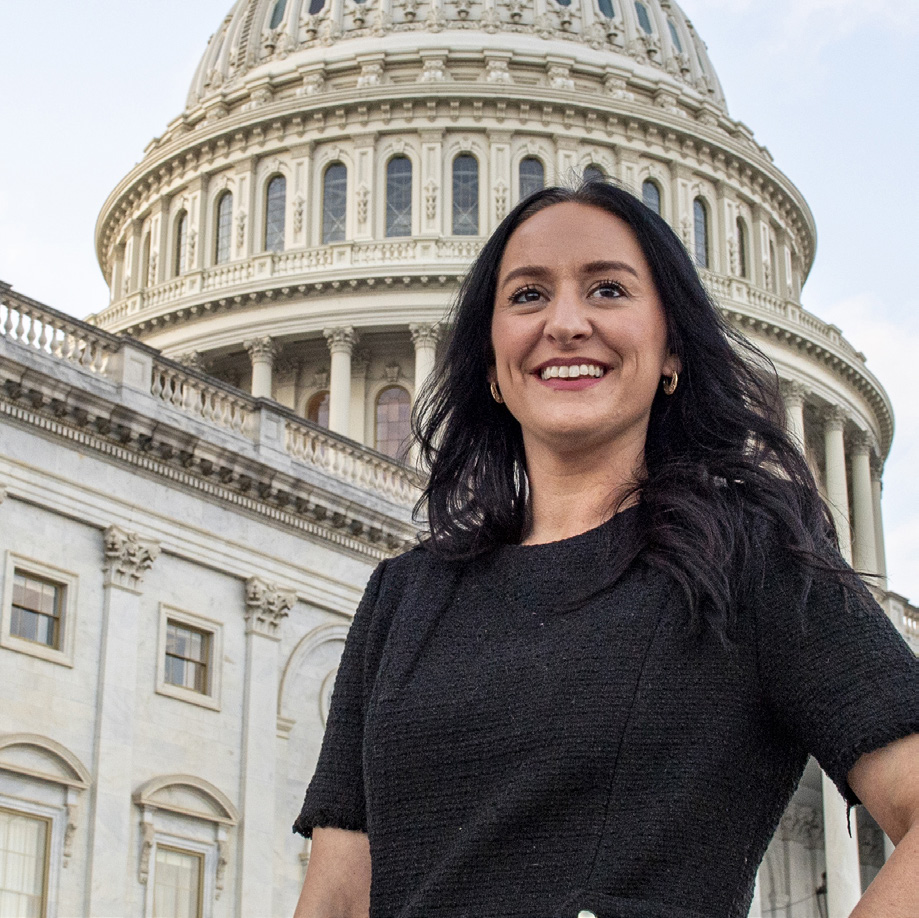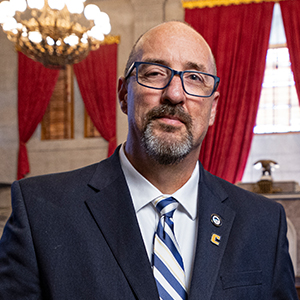
Lucas Da Pieve (Knoxville ’13)
Deputy Legislative Director for U.S. Sen. Bill Hagerty (R-TN)
For two years studying at UT Knoxville, Lucas Da Pieve (Knoxville ’13) remained undecided about his major. Then one class changed everything.
In constitutional law class, Da Pieve listened to instructor Ted Brown, Jr.’s passionate lectures about the U.S. Constitution.
“He got so excited over what seemed at the time, when you read the syllabus, trivial constitutional cases. But the way that he taught it engaged the class and got me really excited about learning more and being involved in some constitutional matters,” Da Pieve says.
Then when he met U.S. Sen. Lamar Alexander, he learned about the Congressional Internship Program. He applied and became Alexander’s intern. He punched holes in papers and put together binders of information. Then he advanced into answering phones, then letters, then began writing the content that went into the binders.
Da Pieve’s desire to give back developed after his family immigrated to the U.S. from Argentina.
“There is no other country in the world where you could have landed here in 1998, learned to speak English by 2000 and then by 2014 have already worked in the Senate, the White House and for two great senators,” he says. “It’s just a matter of respect, love and appreciation for the opportunities that this country gave me and my family, and to try to give that back to others.”
Now as a deputy legislative director, he’s perfected his explanation of his job. The federal government spends $6.8 trillion a year. Of that $6.8 trillion, the Appropriations Committee oversees the discretionary spending of $1.7 trillion.
“Sen. Hagerty is a member of the Appropriations Committee, so I help lead his work on the Appropriations Committee, helping explain, prioritize and make sure that he’s making the most fiscally responsible decisions,” he says.
But the work also means listening to constituents and trying to help them solve problems, such as invasive carp that were ruining lakes and impacting the Tennessee economy. Da Pieve worked with colleagues to find a solution through two new programs developed through a multi-year process.
“As staff members, we don’t get to make the decisions. We don’t get to have really much of a say, but we get to help people that are in really powerful positions make the right choices or help them understand a problem so that they can fix it. We’re a small little cog in a big wheel that helps drive the greatest nation on Earth forward.”

Alexandra Schnelle Shucard (Knoxville ’14, ’16)
Deputy Chief of Staff for U.S. Rep. Steve Cohen (D-Memphis)
When Alexandra Schnelle Shucard looks at the U.S. Capitol every day, she feels grateful for where her career has led her.
“I’ve told myself when I don’t feel that way that’s when it’s time to maybe move on, when I don’t recognize what an honor and privilege it is to serve the United States government in its capacity for Tennessee, for Memphis, for Congressman (Steve) Cohen,” she says.
For Shucard, politics have long been part of her life as her parents were civically active. Her mother was Gov. Phil Bredesen’s first employee at HealthAmerica Corporation and ran his first two mayoral campaigns.
“I was always in a household where going to vote and being involved in local elections and politics was really important,” she says. “It just felt like a natural fit for me to pursue that line of work.”
When an internship led her to Cohen’s office, it became a full circle for her. Cohen led the efforts to establish the Tennessee Hope Scholarship, which has allowed thousands of students, including Shucard, to attend college without student loans. Then while studying political science at UT Knoxville, she participated in the Congressional Internship Program, which opened the door at Cohen’s office.
Her career climb began with a mindset to become the best person who worked in each successive role.
“I only wanted to come to D.C. if I could serve a Tennessee member and serve my state,” she says. “As someone who has born and raised in Nashville, a product of public schools and then a graduate of UT, both undergraduate and grad school, the state has given me so much personally and professionally. It was really important to me to give back to my state and to do that up here.”
Now as deputy chief of staff, Shucard helps to run the office as well as oversees the representative’s committee work on the Transportation and Infrastructure Committee. Her work helped to secure the passage of more than a dozen key provisions in the Infrastructure Investment and Jobs Act and the 2024 FAA Reauthorization Act, which helped to enhance traveler safety on the road and in the air.
“With the right change agents and the right people in these positions, you can really make such an impact on Tennesseans’ lives and that was something I really wanted to be a part of,” she says.
Lou Hanemann (Chattanooga ’17)
Tennessee Higher Education Commission and Tennessee Student Assistance Corporation Chief of External Relations

For Lou Hanemann, public service means helping institutions be the best versions of themselves.
Hanemann came into public service as a second career after working as a printer. While studying at Middle Tennessee State University, a legislative internship with the Tennessee Board of Regents led to a full-time job with the board. Then he accepted a University of Tennessee government relations role (and earned his master’s degree). In 2017, he moved to the Tennessee Higher Education Commission (THEC), beginning as a legislative liaison before advancing.
“I work for the state of Tennessee and I work for Tennessee students, and politics, kind of, be darned,” he says. “I’m more interested in good public policy.”
That policy impacts all of public and private higher education in Tennessee.
“We can’t create in a vacuum because context matters,” he says. “How are we supposed to lead the armada if we’re not accounting for ships of all sizes?”
As a coordinating agency, THEC makes recommendations for key state investments at public institutions of higher education.
“The state doesn’t have an unlimited number of [financial] levers to pull,” he says. “The ones it does have, it should use them efficiently and effectively.”
But there’s another component to the work that THEC does, according to Hanemann.
“We’re setting the table for the next generation. That’s an investment worth making,” he says.
He points to the Lottery Omnibus Bill passed in 2008 as such an investment. At 11:30 p.m. on the last day of the session, he sat in the senate speaker’s office with 10 other higher education stakeholders reviewing the final 33-page bill the final compromise report between the two chambers.
“It sinks in in those moments of ‘Wow, when people come together and push through, things happen,’” he says. “And what came out of that? We have programs for veterans now in the lottery. We expanded the HOPE awards. We do things for lowincome students and non-traditional students.”
Hanemann joked that higher education work can be like turning an aircraft carrier in the Panama Canal.
“That doesn’t mean we’re not going to try,” he says. “But the 1,000-point turn is packed with decision trees that you have to move through…it moves slow because the implications are huge.”
Learn more about other UT alumni who serve the state of Tennessee and the nation.
UT Alumni on the Hill


